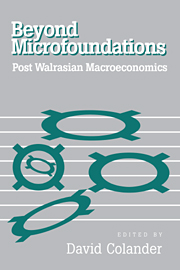Book contents
- Frontmatter
- Contents
- About the authors
- Preface
- 1 Overview
- I The Post Walrasian macroeconomic vision
- II The underpinnings of Post Walrasian macroeconomics
- 5 The evolution of macroeconomics: the origins of Post Walrasian macroeconomics
- 6 Chaos theory and Post Walrasian macroeconomics
- 7 Marshallian general equilibrium analysis
- III Modeling a Post Walrasian economy
- IV New structuralist macroeconomics vs. Post Walrasian macroeconomics
- IV Appendix: Literature Survey
- Name Index
- Subject Index
6 - Chaos theory and Post Walrasian macroeconomics
Published online by Cambridge University Press: 05 June 2012
- Frontmatter
- Contents
- About the authors
- Preface
- 1 Overview
- I The Post Walrasian macroeconomic vision
- II The underpinnings of Post Walrasian macroeconomics
- 5 The evolution of macroeconomics: the origins of Post Walrasian macroeconomics
- 6 Chaos theory and Post Walrasian macroeconomics
- 7 Marshallian general equilibrium analysis
- III Modeling a Post Walrasian economy
- IV New structuralist macroeconomics vs. Post Walrasian macroeconomics
- IV Appendix: Literature Survey
- Name Index
- Subject Index
Summary
Introduction
In Chapter 4, David Colander conceptualizes the problem of multiple equilibria and coordination failure as constituting the problem of the “macrofoundations of micro.” Whereas New Classical economists argue that the rational expectations hypothesis (REH) provides a rigorous “microeconomic foundation of macro,” Colander argues Post Walrasian theory has stood the earlier problem on its head in that the apparent ubiquity of coordination failure problems in a world of REH multiple equilibria destroys the alleged microfoundations that were to determine macro. Micro decision making is seen to be contingent on solving the macro coordination problem.
In this paper I spell out some of the analytic foundations for positions such as Colander's. In doing so I show that the problems for the REH microfoundations approach become even more severely exacerbated when it is recognized that such models not only can generate multiple equilibria, but that many of these equilibria may well be chaotic or complex in other ways. This fact profoundly impacts both the complexity of the coordination problem and the likelihood that failures will arise in a decentralized decision making economy. Combined with indeterminacy of equilibria, the possibility of such dynamics makes it extremely unlikely that economic agents can form rational expectations (Rosser, 1995). In effect the new approach presented by the authors in this book uses the rational expectations hypothesis to show how if one takes it seriously, it undermines not only much of the Keynesian macroeconomic theory of the past, but also the New Classical theory.
- Type
- Chapter
- Information
- Beyond MicrofoundationsPost Walrasian Economics, pp. 87 - 108Publisher: Cambridge University PressPrint publication year: 1996
- 2
- Cited by



